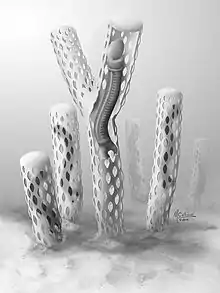Margaretia
Margaretia is a frondose organism known from the middle Cambrian Burgess shale and the Kinzers Formation of Pennsylvania.[1] Its fronds reached about 10 cm in length and are peppered with a range of length-parallel oval holes. It was originally interpreted as an alcyonarian coral.[2] It was later reclassified as a green alga closely resembling modern Caulerpa by D.F. Satterthwait in her Ph.D. thesis in 1976,[3] a finding supported by Conway Morris and Robison in 1988.[2] More recently, it has been treated as an organic tube, that is used as nest of hemichordate Oesia.[4]
| Margaretia Temporal range: | |
|---|---|
 | |
| Reconstruction of M. dorus as organic tube that is associated with Oesia disjuncta | |
| Scientific classification | |
| Kingdom: | incertae sedis |
| Genus: | †Margaretia Walcott, 1931 |
| Species: | †M. dorus |
| Binomial name | |
| †Margaretia dorus Walcott, 1931 | |
References
- Briggs, D. E. G.; Erwin, D. H.; Collier, F. J. (1995), Fossils of the Burgess Shale, Washington: Smithsonian Inst Press, ISBN 1-56098-659-X, OCLC 231793738
- S.Conway Morris and R.A. Robison, "More soft-bodied Animals and Algae from the Middle Cambrian of Utah and British Columbia", University of Kansas Paleontological Contributions, Paper 122, pages 8-11, 1988.
- Donna Fields Satterthwait, Paleobiology and Paleoecology of Middle Cambrian Algae from Western North America, Ph.D. Thesis University of California at Los Angeles, 1976.
- Nanglu, Karma; Caron, Jean-Bernard; Conway Morris, Simon; Cameron, Christopher B. (2016). "Cambrian suspension-feeding tubicolous hemichordates". BMC Biology. 14 (1): 56. doi:10.1186/s12915-016-0271-4. ISSN 1741-7007. PMC 4936055. PMID 27383414.
External links
- "Margaretia dorus". Burgess Shale Fossil Gallery. Virtual Museum of Canada. 2011. Archived from the original on 2020-11-12.
This article is issued from Wikipedia. The text is licensed under Creative Commons - Attribution - Sharealike. Additional terms may apply for the media files.